WNPR (LLEP doctoral student, Robert Cotto previews the upcoming Supreme Court case on school funding)
Our Students
Grad Student, David Onuorah, Excited to Join Men’s Basketball Team and Sport Management Program
Hartford Courant (Cornell University Graduate Joins the University of Connecticut Huskies to build his basketball profile for a pro career as well as to prepare for a career after basketball in Sport Management)
UCAPP’s Summer PLUS Students
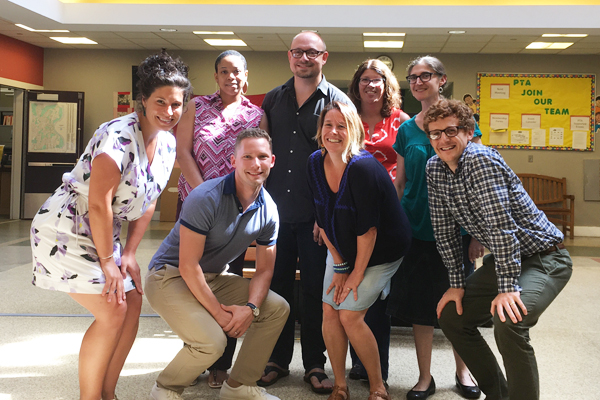
This past summer Dr. Sarah Woulfin taught the Educational Policy course to the PLUS Hartford cohort. Students analyzed multiple current policy issues, including educator evaluation, state assessment policies, school discipline, and the CCJEF decision. Dr. Carbone, a Hartford Public Schools superintendent and Neag Ed.D. graduate, was a guest speaker on principals’ roles in enacting district initiatives.
Neag School Accolades – July and August 2017
Congratulations to our Neag School alumni, faculty, staff, and students on their continued accomplishments inside and outside the classroom, outlined in this month’s issue of Neag School Accolades.
Neag School Accolades – June 2017
Congratulations to our Neag School alumni, faculty, staff, and students on their continued accomplishments inside and outside the classroom, outlined in this month’s issue of Neag School Accolades.
What Being a High School Dropout Taught Me About Teaching
Editor’s Note: The following piece — written by Neag School doctoral student Kristi Kaeppel — originally appeared on the UConn Graduate Certificate in College Instruction blog.
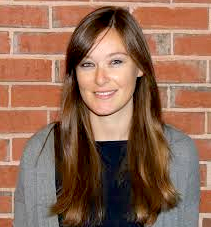
I recently began working on a project that looks at how teachers form their beliefs and conceptions of teaching. Like so much of learning, it seems teachers’ beliefs develop incidentally through experience and observation. Perhaps we model our beloved high school science teacher or we imagine ourselves rousing students from boredom a la Robin Williams in “Dead Poets Society.”
When I got reflecting on my own conceptions of teaching, it struck me that so much of how I conduct myself as a teacher comes from having been a failing, disengaged student in high school. When I stepped into my first teaching role in Adult Basic Education, my main objective was to avoid creating the kind of educational environment I so loathed as a teenager.
“I spent a long time hiding the fact that I dropped out of high school. … I think I have finally overcome the stigma and can instead turn my early experiences failing in school into a strength.”
— Kristi Kaeppel, Doctoral Student
Two anecdotes illustrate my loss of faith in schooling that led, along with a slew of other factors, to my eventual dropping out of high school. Looking back on them now, they also make good case studies of what NOT to do as an instructor (especially the first):
- It was sophomore year, and I was just starting to check out of school, but finally, we were reading a book that captivated me: Great Expectations by Charles Dickens. I hadn’t done many of the assignments all year, but I applied myself to an essay assigned on the book with rare enthusiasm and concentration. I was proud of my work and eager for feedback. When I got my paper back, I had failed with a note saying that it was “very, very, well-written” and that I must’ve plagiarized. And like that, I checked back out beyond return.
- It was senior year. By this time I was merely a seat warmer in school on the rare occasion that I showed up. Again, there was a glimmer of hope in my high school English class as the teacher held up two books — Go Ask Alice, a (in my opinion) poorly written piece of anti-drug propaganda and The Bell Jar, by Sylvia Plath, a masterpiece and (sadly for me since it features a depressed teenager) one of the books I most identified with. The teacher asked the class which one we should read. I think I was the only one who voted for The Bell Jar. This confirmed that I did indeed have nothing in common with my classmates and that I would be better off staying home and reading.

Adolescent angst and arrogance aside, these two stories illustrate some teaching approaches I was determined not to replicate:
First, I would trust my students and give them the benefit of the doubt. I would not make accusations; I would listen and approach them with compassion. Even if someone does cheat, why are they cheating? What is going on with them that cheating is a viable option and how can I make authentic learning more attractive to them?
While the teacher in the second story did at least try to have a democratic classroom and allow student choice, I think one could go a step further by allowing even more autonomy and choice in assignments. If some people were drawn to one book and others to another, why not have book groups?
The larger point I took away from both of these stories was to always look for those signs of student interest and curiosity and try to kindle, not extinguish, them.
This is easier said than done. It was much easier to be the failing student with my head down in class who muttered insults about the class under my breath than to become a teacher and have one of the most important responsibilities in society.
“My goal as a teacher is to try and create those conditions where … natural-born, inherent curiosity can thrive.”
I spent a long time hiding the fact that I dropped out of high school. Now that I am in a Ph.D. program, I think I have finally overcome the stigma and can instead turn my early experiences failing in school into a strength.
Perhaps one difficulty for many instructors is that they were model students, and so it’s hard to conceive of the mindset of those students who appear lazy, disengaged, and unmotivated.
I was that person. But I had curiosity and a love of learning. I just didn’t find a home for it in school. My goal as a teacher is to try and create those conditions where that natural-born, inherent curiosity can thrive. If hadn’t been for my own experiences failing out of school, I may not have appreciated just how much potential and dormant academic interest can be concealed under the guise of an apathetic student.
Kristi Kaeppel is a doctoral student in the Neag School’s Learning, Leadership, and Educational Policy program with a concentration in Adult Learning. She works as a graduate assistant for the UConn Graduate Certificate in College Instruction (GCCI) program. GCCI is a nine-credit program for individuals interested in expanding their preparation in and understanding of college teaching.
New Principal Appointed for Avon High School
Hartford Courant, EDLR alum and current doctoral student David Peling has been appointed principal
Superintendent of Hartford Public Schools Visits EDLR Students
“Leaders must be close enough to relate to others, but far enough ahead to motivate them.”- John C. Maxwell
On April 24, 2017 students in Professor Joshua Hyman’s class, EDLR 6322: Economics of Education Reform were able to learn about and discuss the characteristics of this kind of servant leadership in education from the first hand account of Superintendent of Hartford Public Sc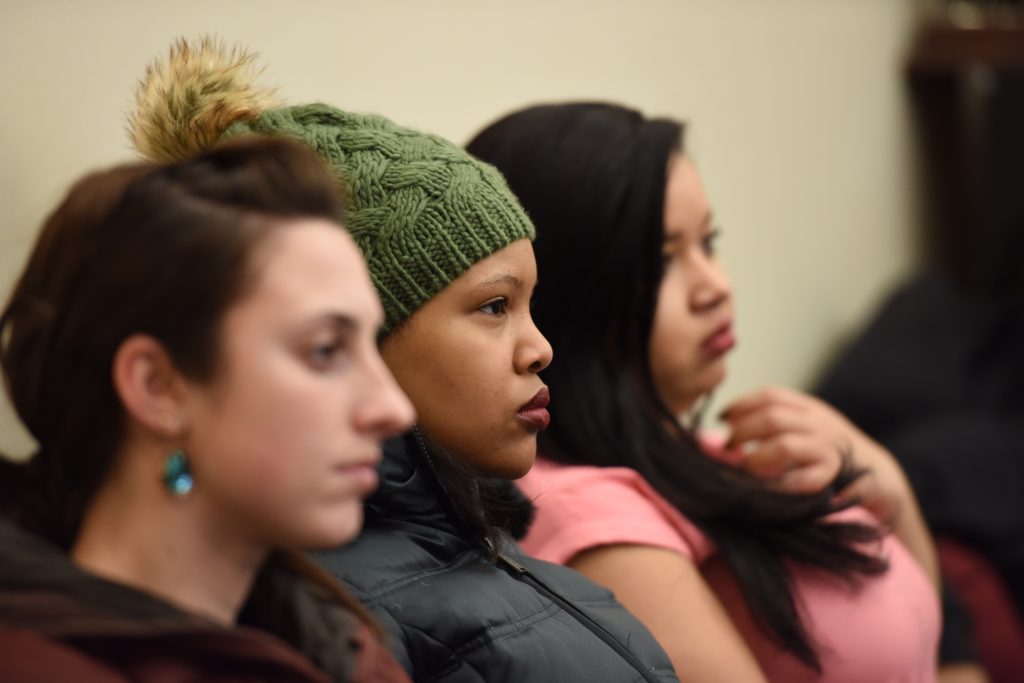 hools, Dr. Leslie Torres-Rodriguez, who was recently appointed after having served as interim superintendent since December 9, 2016, and her leadership abilities embody this quote.
hools, Dr. Leslie Torres-Rodriguez, who was recently appointed after having served as interim superintendent since December 9, 2016, and her leadership abilities embody this quote.
Torres-Rodriguez was an ELL, English Language Learner, student in Hartford Public Schools and having worked in the Greater Hartford Area for the past 22 years, has a strong connection with the community. Student Michael Corral commented, “She is invested in the city of Hartford, and is not trying to use it as a stepping stone to some other position or district.” The Superintendent herself expressed how important the success of the Hartford school district is to her personally, and not just as a job. She understands the families and students as she once felt she was a “disenfranchised” student of the school district, and now strives to be an agent for positive change and open ear for the concerns of the community.
Dr. Torres-Rodriguez maintains her relations with her constituents by being transparent, honest, accountable, and using feedback to focus on how policy and school leadership can improve. With an increasing number of ELL students and 20% of students being special education; she is mindful that change for the district is moving towards a more diverse population, and therefore requires policy to accommodate student needs. The superintendent brings an important humanistic element and strong academic qualifications into the field with her background in Human Development (B.S, University of Connecticut), Social Work (M.S., University of Connecticut), and Educational Leadership (Ed.D Central Connecticut State University). She believes that her less traditional path has furthered her skills as a leader in education as she brings an anthropological background to her passion for education.
During her visit, the superintendent gave insight into many of the challenges of her position as well as how she is managing these new challenges. Students in Professor Hyman’s class benefited from this discussion, as they were able to listen to her first hand experiences and see a glimpse of how a large local school district superintendent operates.
Student, Sarah Redlich, commented,
“I found her discussion of the different stakeholders she works with and how she considers the implications of decisions for the operation of the Hartford school system to be very interesting. The perspectives Dr. Leslie Torres-Rodriguez shared helped me explore the important decisions and considerations that are involved with being a school leader.”
This comes from a discussion about the multifaceted nature of being a superintendent. Dr. Torres-Rodriguez, does not just service Hartford Public schools, but she is in charge of overseeing the placement of Hartford students in other districts, a transition that Hartford funds, as well as some oversight over the cities’ magnet and charter schools. Because of this she must have strong community ties and an eye for good policy. She enlightened the class on managing funding, ensuring good relations with these other schools, and how to insure the academic and emotional well-being for a diverse population of students in the cities’ schools. Student. Michael Corral, particularly benefited from her discussion about the complexities of acquiring funding and developing a budget as he noted, 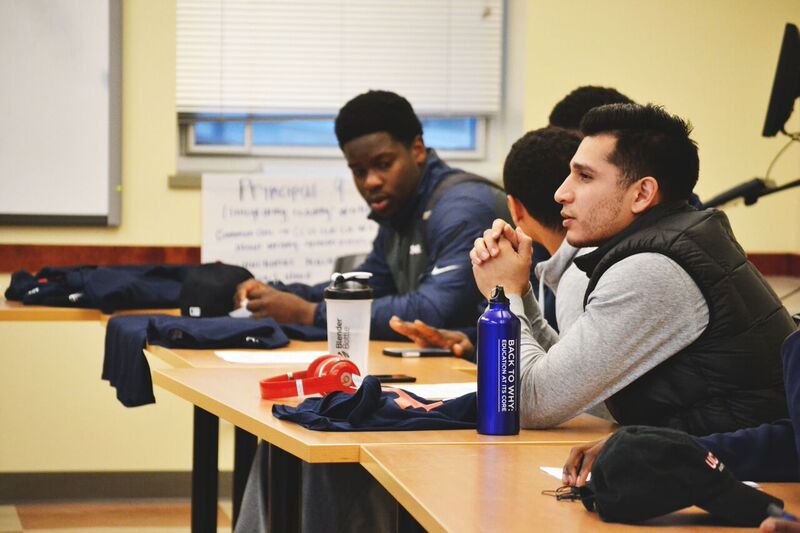
“It was nice to listen about the application of funding models and how they are formulated with the best of intentions but can - at times - perpetuate many of the injustices they are supposed to address.”
It is key to note that the formula for a successful school district is not always easy, but Dr. Torres-Rodriguez shed light on how to weigh issues, remain transparent, and work with other stakeholders to develop good policy, and leave it adaptable as the nature of education is not static.
The class was highly engaged as they asked Dr. Torres-Rodriguez questions about her approach towards fiscal policy, diversifying student needs, maintaining enrollment in schools while respecting parent-school choice, and interacting with key stakeholders, such as the board, school leadership and her constituents. After these in-depth questions about her experience, student, Daron Cyr, asked a very important question, ‘How does she do it all?’
Dr. Torres-Rodriguez said that it was a combination of self-care, having a network of other educational leaders, who see things from the same systemic viewpoints, and her drive to help Hartford schools and students succeed. She emphasized her passion by saying, “If there was a hill I would die on, it would be this.” Meaning she is ready to do everything she can to work for this community. As a product of the system, and as someone, who has worked in Hartford for a long time she admits she has seen the city’s failures, but she also sees great potential, and this is what she is working towards.
This was a high-energy and inspiring conversation that the students actively benefited from. It brought life to the issues and policies the Ph.D students have learned about in professor Hyman’s class, and throughout their education. Professor Hyman commented on this experience,
“While my hope is that my students learn a lot about education policy from the course readings, discussion, and lecture, there is really no substitute for engaging with and learning from a long-time teacher and district administrator serving in disadvantaged communities.”
The Department of Educational Leadership extends a warm thank you to Dr. Torres-Rodriguez for providing insight into the inner workings of developing a budget, editing and adding policies all while maintaining a relationship with the community. This type of hands on experience offers our students an opportunity to engage with a local, yet high profile professional which contributes to their interactive classroom experience that Dr. Hyman works to create.
Rachel Hill Will Get UConn Degree, Then Catch Up With Pride
Norwich Bulletin (Sport Management major Rachel Hill to join National Women’s Soccer League following graduation)
10 Questions With Student-Athlete and Current Sport Management Student, Marisa Maccario
Editor’s Note: This story, written by Neag School's Stefanie Dion-Jones, originally appeared on the Neag School’s website.
In our recurring 10 Questions series, the Neag School catches up with students, alumni, faculty, and others throughout the year to give you a glimpse into their Neag School experience and their current career, research, or community activities.
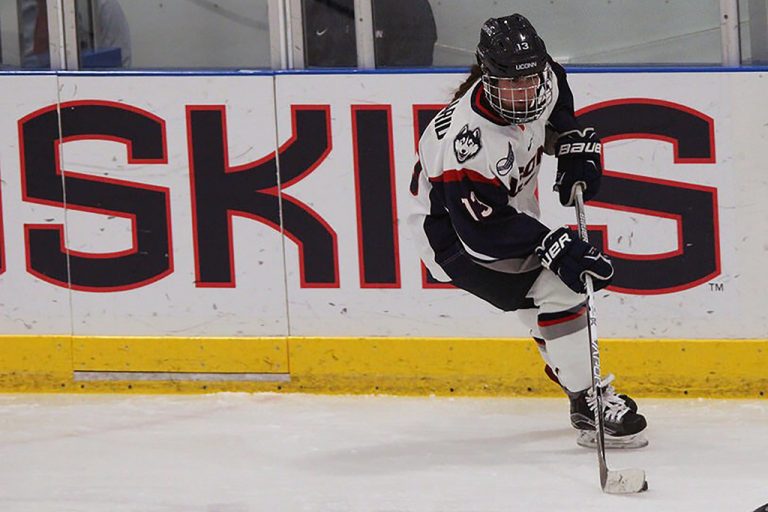
UConn women’s ice hockey forward Marisa Maccario ’18 (ED), a native of Marblehead, Mass., has been playing on a hockey team since the age of 5. Currently a sport management major in the Neag School, Maccario created a video this past fall for what she describes as her favorite class at UConn: Sport in Society, led by assistant professor Joseph Cooper. The video she co-produced has since been featured on youcanplayproject.org, an initiative dedicated to ensuring equality, respect, and safety for all those who participate in sports, regardless of sexual orientation and/or gender identity. Here, Maccario talks about her experience as a student-athlete, about the video project, and more.
What kind of time commitment does the ice hockey training and traveling schedule demand? How do you balance that with coursework and free time? The ice hockey season sits between both the fall and spring semesters, so our school year is very busy. We get started within the very first weeks of school and go all the way until March. We are on campus training over Thanksgiving, most of Christmas break, and sometimes spring break.
Once classes start back up, most of our team manages time very well with classes in the morning, a break in the afternoon for hockey, and classes at night. Mostly after classes is when we have study hall, tutors, and time to get all of our work done for the weeks ahead. The good part about the league we are in (Hockey East) is that all the schools are relatively close (for example, Boston College, Boston University, Northeastern, Providence, University of Vermont, and University of Maine). Seeing that we play schools that are close by, we are able to do day trips and do not have to travel Thursday through Sunday. Instead, we do day trips, which in turn helps our study schedule.
“Never use a busy schedule as an excuse. You can always make time to do something you love. Here at UConn, they give the option to play a sport you love — and enter into a very competitive program that will help you be successful once your sport it over.”
What made you decide to major in sport management? It just felt right. I can never see myself leaving the sports world. Seeing that I have been an athlete my whole life and got the chance to further my athletic commitment into college, once I am done competing, I want to be able to see what goes on behind the scenes — [something] that, typically, athletes don’t get a chance to see. I want to be part of someone else’s experience, not as a teammate or a competitor.
What about the sport management program at the Neag School have you found most valuable so far? Sport management not only is in a field related to sports, but it’s also in a school that has an educational leadership program. … Having a sport management program in the same school as educational leadership, for example, shows how leadership is important not only on the field or ice, but also in the classroom.
Tell me about the video project you created for Joseph Cooper’s Sport in Society course last semester. The guidelines were very open to whatever you wanted: pictures, PowerPoints, paintings, or videos. You just needed to talk about how society impacts sports and what you have learned throughout the semester.
We decided to put together this video in particular because we thought that not only was it a topic we talked about in class, but also something that impacts athletics at UConn greatly. We are a campus and athletic culture that accepts everyone and anyone for who they are, and not what society tells them to be. Student-athletes need to show their openness in these matters to make sure they and their teammates feel comfortable competing for a school that doesn’t care about your gender, race, or sexual orientation. If you can play the sport, that’s all that matters!
In your own words, why is inclusiveness in sports so important? With a sport like ice hockey, you have six players on the ice at a time: one in the net and five skaters. To be a team, you need to have skills from each player to win and, with hockey, everyone brings something different. If we didn’t have inclusiveness in sports, we wouldn’t have teams; we would have individuals playing sports.
The whole point of sports is to win, and with winning comes a group effort. You need to have different abilities with the same goal in mind. You need to be able to have open arms to new people because you never know who will be leading you to a national championship. If you can play, you can play. It shouldn’t matter about anything else as long as you want to win.
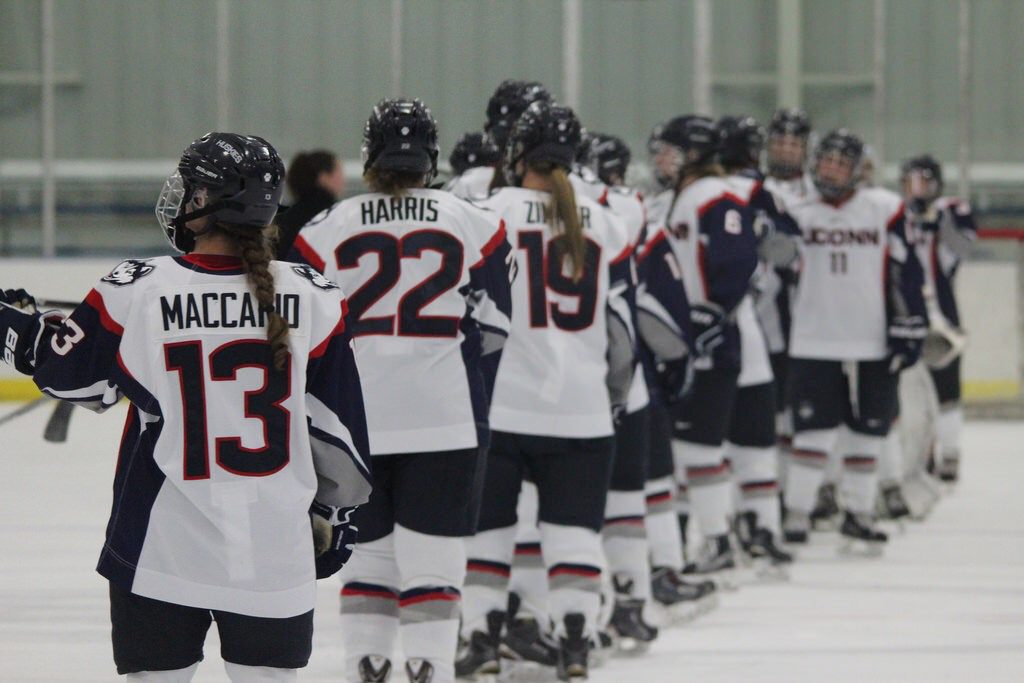
How can coaches and teammates ensure that the team they lead or play on is as inclusive as possible? I think the best attitude that any player or coach can have is to look at work ethic, skills, and technique because that’s what makes an athlete an athlete. I believe at UConn we have a lot of student-athletes and coaches that judge off those rules and nothing else. … We bring each other up. Positive attitude and inclusiveness are key especially on our team, because your team is your family away from home. With 500+ athletes at a top university, everyone has to be on the same page and know that discrimination is something that doesn’t mix well with a winning culture. So that is left at the door the second you set foot on our campus.
What kind of reaction have you received from those who have seen the video? I have experienced a lot of positive feedback from the video — way more than I thought. I had someone tell me that when they attended the university, an article was released stating that UConn was ranked by the Princeton Review as No. 12 among the 20 most homophobic campuses in the country. Today, we have a video stating that we support our teammates that identify as lesbian, gay, bisexual and transgender. How times have changed — and will continue to change for the better. When doing this video we, the UConn student-athletes, pledged to keep our campus safe for all, and I think that, in itself, has touched a lot of people, both current and alumni student-athletes.
What’s your advice for those students who may be interested in checking out either the Neag School’s sport management program — or the sport of ice hockey? Never be afraid to do too much. By this I mean: Do everything you want to do and more. Never use a busy schedule as an excuse. You can always make time to do something you love. Here at UConn, they give the option to play a sport you love — and enter into a very competitive program that will help you be successful once your sport it over.
Always ask questions because you never know who you might be talking to and where they can lead you in the future. That’s what is great about the sport management program; the professors are great connections for down the road when you’re looking for jobs.
What’s your favorite spot on campus? My favorite spot on campus would have to be the rink, not only because I spend most of my time there on and off the ice, but also because it is home. The rink is not just for hockey, but a safe place where I can always go when I’m stressed and have a lot of work.
What’s something most people don’t know about you? I am second-generation Italian- American; my grandmother was a refugee during War World ll and traveled to America.
Read other installments of the Neag School’s 10 Questions series here.